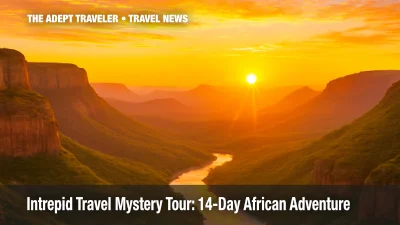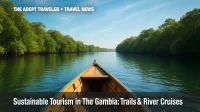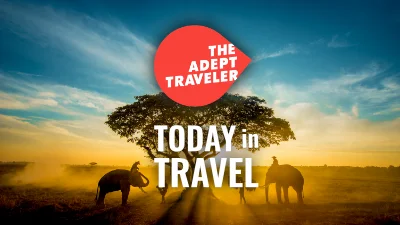Zimbabwe
Travel to Zimbabwe, a land that dances to the rhythm of the Zambezi River, where the air carries the distant roar of Victoria Falls—a curtain of liquid thunder so powerful you can almost taste the mist in the air. Hmm, it's odd how, when I think about it, the scent of acacia combined with a gentle waft of wood smoke from evening fires holds a charm so captivating, it's hard to forget. Actually, the rich tapestry of wildlife here—majestic elephants and stealthy leopards camouflaged in golden grasslands—interrupts your thoughts, almost as if they’re part of some vivid, living painting. That’s the thing with travel to Zimbabwe, every sense is heightened, like when you bite into a freshly grilled meal, spicy and succulent, under the endless southern skies that stretch infinitely, teasing your very sense of perspective. And now, come to think of it, it’s like Zimbabwe isn’t just a place you visit; it’s an experience you surrender to, willingly led by mystery and vibrant life at every corner. It makes me wonder, isn't there something intrinsic about how travel changes us, reshaping our thoughts even as we try to capture every detail? Maybe, just maybe, the quiet whispers of Shona songs or the way the sunset paints the earth in shades of burnt gold could make one ponder—why haven’t more people travel to Zimbabwe and let it weave its magic around them? You know, writing about this now makes me question if I'm doing it justice, honestly, since it's something words barely seem to contain...
Zimbabwe Travel Season
Traveling to Zimbabwe is an adventure that invites both excitement and contemplation. Some might say the best time to visit spans from May to October—the dry season, when the weather is incredibly favorable for safaris and wildlife viewing. The temperatures are mild, dry days followed by cool nights. Not too hot, not too cold. It’s just right really. But you know, come to think of it, sometimes there's this temptation to avoid the crowd, right? So it’s not just about the weather.
Yes, May to October is peak season. It’s when you’ll encounter the bustling energy of travelers from all over the globe who've flocked to Zimbabwe for its famed attractions. Imagine witnessing the mighty Victoria Falls, and hearing that thunderous roar amidst a crowd of fellow wanderers. It's exhilarating yet shared with many others. But isn’t having a slice of privacy amongst such grandeur tempting? Travel to Zimbabwe in April, perhaps, just before the peak buzz begins—or even in November as it starts to taper off. This offset could provide a more intimate encounter with the natural beauty.
Now here's a thought that kind of dances around in my brain—the shoulder seasons, as they call them. April and November are the months where you might just find a balance. The pause between extremes, seasons shifting. You avoid the throng while still catching sight of the wildlife that hasn't yet scattered. I sometimes think these transition moments are like secret windows of opportunity. Isn't life sometimes about slipping through before the doors of chance swing closed?
When you travel to Zimbabwe during these quieter months, crowds are thinner and the rains haven't fully claimed the landscape. You might find yourself in a world where every giraffe and zebra feels like it's there just for you. But even if good timing helps dodge the mass crowds, there’s that chance you might encounter some rain, which, come to think of it, isn't entirely a bad thing. There's a lushness that comes alive in the wet season, but, jotting this down makes me realize—that's my personal reflection, really. Others might not see the charm in a muddier terrain.
December to March marks the rainy season—a time when the idea of travel might seem a bit, well, damp, literally and figuratively. And yet, those heavy showers transform the land into a green paradise. It’s this paradox. Less ideal for certain activities like game drives, sure. But birdwatching lovers revel in these months. Nature chooses its own way to flourish, sometimes far removed from our travel plans. It's a quieter time, a time for introspection as the rains patter down in rhythmic pause.
I find it funny how we chase after these dream seasons for travel, always weighing the pros and cons—sometimes all it takes is a local festival or holiday to change the whole dynamic. Think about the Harare International Festival of the Arts, for example, in April or May. It brings in a flurry of creativity and culture. Unexpected interactions with locals are almost always the highlights that punctuate travel memories, right?
Long after your flight lands back home, it's these seasonal decisions that shape the narrative you tell. I'd say, half of the thrill of travel to Zimbabwe lies within these choices. Maybe there's no perfect time—just the perfect mindset while traveling, perhaps. Every cherishable season encased within the uniqueness you color it with. I’m left with the thought: is it us who choose the best time to travel, or does the time choose us when we're ready to see it's charm?
The Weather and Seasons in Zimbabwe
So, you're thinking about travel to Zimbabwe, huh? Honestly, it's a place that doesn't get enough credit when we're chatting about ideal travel spots. The climate? Well, let's dive in, shall we? The country's a bit split up in terms of its weather, largely due to its high elevation. You've got the northeast, which is blessed with more rainfall, and then the low-lying areas which are a tad drier. It's interesting, come to think of it, how the geography dances with the climate to create these little micro-zones of weather activity.
Seasons and What to Expect
There's a bit of everything climate-wise when you travel to Zimbabwe throughout the year. You know, sometimes I wonder how locals manage the transitions. For starters, the summer season runs from November through March, and this period is marked by the rainy season. Temperatures typically hover around 86°F (30°C), but it can feel a bit warmer due to the humidity. The air gets thick, saturated with moisture, and you can practically feel it on your skin. But then again, isn’t that just a part of the charm?
Now, if we're veering into the dry season, this spans from April to October. Ah, this period’s quite lovely—temperatures become milder. We're talking about delightful days at around 77°F (25°C), sometimes even lower. There's minimal rainfall, and evenings can surprise you with a cooler bite than expected. As someone who's thought about traveling during these months, you might find this the best time to visit cities like Harare or Bulawayo, where the climate is just pleasant enough for exploring without breaking a sweat.
Rainfall and Its Impact
Rainfall in Zimbabwe is an intriguing dance of nature. The wet season can be both a blessing and a bit of a challenge. On one hand, the rains breathe life into the landscapes, turning them lush and vibrant. Ever taken a stroll after a rainfall? The earthy aroma is unmissable. However, heavy rains can bring flooding, and sometimes, travel can get tricky. I often wonder how the locals adapt with such grace. Travel during this time is for the more adventurous spirits — those who don't mind a little unpredictability in their plans.
In the western and southern parts of Zimbabwe, rainfall can be significantly less in comparison to the rest of the country. Perhaps that's why the landscapes here take on a more rugged, dramatic appearance. Sort of a stark reminder of the delicate balance between water and earth.
Temperature Fluctuations: A Reflection
Throughout the year, temperatures in Zimbabwe do this little dance that I often find fascinating. It's almost like they're trying to play a guessing game with you. Highs can simmer around 86°F (30°C) during the peak of summer, while the cooler months bring relief, dropping to about 50°F (10°C) in the highlands. And, oh, those highland areas, what an experience to feel the temperature dip and require a light jacket even in the supposed warmth. It’s odd that I think about it this way, but this sort of contrast is just... intriguing. Maybe I'm overthinking it.
Also, nights during the winter months, especially around June and July, can get surprisingly cold, dipping below 40°F (5°C). What's the saying? Never judge a book by its cover. Well, never judge a climate solely by its location. These cooler temperatures, after experiencing the humid heat, give Zimbabwe an added layer of complexity. Perhaps more so than what the average traveler might anticipate.
The Blend of Weather and Events
And let's not forget, travel to Zimbabwe isn't just about weather patterns and thermometers. It's about how these elements interplay with human happenings. Many cultural events coincide with weather patterns. Harvest Festivals in rural areas during the rainy season are a sight to witness. There's an energy, an anticipation when the rains are plentiful. And during the dry season? Wildlife viewing becomes exceptional. Animals congregate around waterholes, making game viewing a surreal experience.
I occasionally find myself reflecting on how a place’s climate can shape experiences, altering perceptions, shifting moods. Maybe that's part of why Zimbabwe remains a memory long after the trip is over. It’s a land where climate and culture are inextricably woven together, creating an adventure steeped in both natural wonder and human vitality. In a world where climate often commands our plans, in Zimbabwe, it feels more like an invitation for discovery.
Accepted Payment Methods and Other Payment Information in Zimbabwe
Hey, so when you're planning to travel to Zimbabwe, you'll quickly notice there's quite a mix of payment options to think about. The local currency is the Zimbabwean dollar (ZWL), which, I must warn you, has had a pretty tumultuous past. Hyperinflation was crazy at a point, but they're trying to stabilize things now. How stable? Hard to say, but they've got some USD usage thrown in there too. Come to think of it, dual currency usage could make things a bit confusing at first, but you'll get the hang of it. Trust me.
When it comes to credit cards, Zimbabwe's gotten somewhat modern with all the usual big names present — Visa, Mastercard, and American Express are your go-tos. Visa and Mastercard can be used pretty widely, but don't expect the same love for Discover or American Express. It’s kind of odd they’re not as popular, but it is what it is. Fast food joints, hotels, and some retailers will accept cards, but, ah, wait until you hit the roadside stalls or tiny rural shops! Cash is definitely king there.
Speaking of cash, you’ll want to carry some with you, especially for small buys or tipping. And tipping...that’s a whole other thing! Travelers often wonder if they should tip in Zimbabwe, which I understand. It's customary in restaurants to leave about 10%–15% if the service is good, but, uh, be sure to leave it in U.S. dollars if you can. The locals really appreciate it. But, now that I think about it, maybe tipping in ZWL isn’t entirely out of the question, though usually less impactful.
Mobile money is sort of big there too, with platforms like EcoCash, but if you’re just visiting, handling mobile wallets might not be your priority. You know, getting the cards sorted or keeping a stash of cash is way easier on the fly. It's funny, really — I started writing this thinking Zimbabwe had only a few oddities with payments, yet here we are juggling all these options.
As a traveler, finding out what payment method works best depends on where you are in the country. Urban areas offer more convenience, generally. Rural Zimbabwe? They rely a lot on cash, so be prepared for that. Kind of a charm as much as a hassle, you'd think. In any case, just, uh, remember to check those exchange rates! Handling the local currency can be an adventure on its own.
So, do thoughts loop back to what’s the best approach while traveling in Zimbabwe? I guess I’d say a mix of card and cash gives you a safety net. And perhaps, as with any travel advice, it pays to be flexible — literally and figuratively. It’s odd that I reflect on this travel advice with a sense of certainty, yet remain aware that these scenarios can pivot so swiftly depending on the day, or the, uh, mood of the moment. But that’s travel for you, right? An unpredictable ride!
Why You Should Travel to Zimbabwe
You know, sometimes you think about a place so vibrant with contradictions and wonders—Zimbabwe is just that kind of place. It’s not just a country; it's this living canvas of experiences that truly stand out in your travel diaries. Sometimes, I feel like I'm trying to capture lightning in a bottle every time I try to explain it.
The Majestic Victoria Falls
When you talk about travel to Zimbabwe, you really can’t skip over the sheer grandeur of Victoria Falls. It's one of those things where you stand there, possibly soaked by the mist, wondering how on earth nature managed this spectacle. The thundering falls are not just something you see; you feel them. Now, come to think of it, they’re almost like a natural performance, where every drop is a performer in a grand symphony.
Wildlife in its Unspoiled Habitat
But then, if you’re a wildlife enthusiast—or even if you’re just a bit curious—Zimbabwe offers some of the most untouched safari experiences. Hwange National Park, for instance, is home to such an extensive range of animals. I sometimes debate whether the solitude of the park heightens its raw elegance. The fact that this destination isn’t overrun with hordes of tourists only adds to its special allure.
Rich Cultural Tapestry
The cultural aspect, that’s where Zimbabwe continues to surprise you. Their Shona and Ndebele traditions weave through the society, giving travelers deeply immersive experiences. Festivals, music, art—it’s this intricate tapestry that tells the story of Zimbabwe. Sometimes I wonder, how much does a traveler truly grasp of a place’s essence if they skip the culture? And then I figure, no, the culture is the soul of the place.
Great Zimbabwe Ruins
Speaking of stories, the Great Zimbabwe ruins are like whispers from the past. It’s fascinating how you walk among the stone structures, and suddenly, history feels so...alive. There’s something hauntingly beautiful about these relics that tell tales of a prosperous civilization. Do they defy time? Maybe. Do they invite questions? Absolutely.
Charming Cities Full of Life
Then there’s the urban charm of Harare and Bulawayo. Sometimes, cities can be so...noteworthy yet understated. They may not have the high-rise thrills of other places, but they offer a delightful peek into modern Zimbabwean life. Gardens, galleries, cafes—it’s the kind of exploration where you’re not just a tourist, but maybe, ever so slightly, an honorary local.
Matobo National Park's Mysteries
Weirdly enough, one doesn't hear about Matobo National Park as much, but it holds its mysteries close. The ancient rocks, balancing precariously—sometimes I think nature really outdid itself here. The cave paintings that grace some of these rocks are pretty much like breadcrumbs leading you to humanity’s early imaginings and expressions. There’s just something mystical about unraveling these enigmas.
Adventure Sports and Activities
Zimbabwe doesn’t just sit back and offer passive pleasures—no, it gets you moving. White-water rafting, bungee jumping, and canoeing are at your disposal, for those who seek a whiff of adrenaline in their travel pursuits. Victorious, no, victorious was too obvious—victorious aura of Victoria Falls somehow transforms itself into this adventure hub where every leap, splash, and glide feels like a tale that must be retold.
Local Cuisine Delights
And then, we must discuss the flavors and tastes. Zimbabwean cuisine deserves its own fanfare. It’s not just food; it’s a narrative of local ingredients, traditional methods, and shared histories. Sadza, biltong, peanut butter stews—they’re all part of this culinary tour that’s as hearty as it’s flavorful. Sometimes you savor a bite, and just pause. How can a simple dish carry such complexity and warmth?
Welcoming People
You wouldn’t typically find Zimbabweans topping bucket lists for sociability, but maybe they should. Their genuine warmth is often what travelers remember most about their Zimbabwe trip. It’s this unscripted friendliness, the smiles, the help offered—you suddenly realize that travel isn’t just about scenery, it's also about connections. Come to think of it; maybe it should top more bucket lists?
Diverse Landscapes and Climate
Finally, it’s impossible to encapsulate travel to Zimbabwe without acknowledging its varied landscapes. Savannahs, granite hills, lush mountains—it’s almost like the land was sculpted with the playfulness of the gods. And the climate, it's as diverse as the landscapes themselves. From dry sunshine to thundering rains, Zimbabwe’s weather accentuates the allure of exploring this intriguing land.
The History of Zimbabwe
So, when we talk about "travel" to Zimbabwe, it's like unraveling this vibrant tapestry of history, crisscrossed with layers of culture and heritage. Zimbabwe, unlike many modern cities with newer histories, offers this mesmerizing saga stretching back centuries—it's like stepping into a living museum. Now, history buffs will get their fill here, for sure, as they wander through the ancient ruins of Great Zimbabwe. Picture this: back in the 11th century, a majestic city, a true testament to African civilization! The structures, mostly built entirely of stone, still stand tall today, silently narrating tales of grandeur. People traveled from afar—so trade and culture intersected here, transforming it into a thriving hub. And, come to think of it, isn’t it fascinating how these ruins survived in such telling silence? It's almost ironic how ancient stones speak louder than words sometimes.
Ah, and there's so much more than just these stones. Imagine the sprawling horizon of the Victoria Falls, another monument, not just limited to Zimbabwe's historical timeline but also woven into its geographical narrative. When you travel to Zimbabwe, this stunning cascade of water, known as "The Smoke That Thunders," can't be missed. It's not only a natural beauty but also a symbol of the region’s deep, elemental force. It’s peculiar how the Falls managed to maintain its majesty while weaving into the modern sense of adventure—Zimbabwe transformed it into a centerpiece of both history and thrill-seeking. And, oh, what a sight it is, sparking contemplation, as if the thundering waters are challenging us to reflect on time's fluidity. It's a travel experience that forces one, maybe against will, to ponder; like it or not, nature confronts us with such existential queries.
Now, dig a little deeper into Zimbabwe's complex history—colonial undertones weave through its cultural fabric. The 19th and 20th centuries ushered in waves of change, as the British colonial imprint left lasting impressions. Harare, the capital, serves as a reminder of these colonial legacies, but then again, doesn’t that add another layer of intrigue? Post-independence in 1980 was a turning point, a mere blip perhaps, but it ushered in a new era. here’s a tension, a sort of cultural tug-of-war that still lingers, shaping Zimbabwe’s modern identity. It’s as if the country is constantly negotiating its past and future. Oddly enough, that’s what makes it fascinating for the traveler with a curious mind. Doesn’t everyone find something enticing in a place that’s not quite settled in its narrative? This duality kind of draws us in—like a story untold.
And, funny enough, it's this very conflict, the interplay of the ancient and the modern, that adds richness to any travel to Zimbabwe. The country’s stunning landscapes, intertwined with history, are like chapters of an unfinished novel that history enthusiasts can’t resist. From the majestic Hwange National Park, teeming with wildlife, whispering secrets of ancient migrations, to the mysterious Matobo Hills, sprinkled with ancient cave paintings—it's a playground for the history lover. Zimbabwe, a land of contrasts and surprises, invites us to question time and space. Isn’t it curious how, in our zealous pursuit of the past, we often find reflections of our future? So, whether it's the ancient stones of Great Zimbabwe or the modern rhythms of Harare, travel to Zimbabwe promises an exploration, an invitation to dance with history. And, I suppose, in that dance, we uncover facets of ourselves we hadn't considered before.
The Culture of Zimbabwe
Travel to Zimbabwe and you'll find a land where diversity meets tradition in the most fascinating ways. It’s a kaleidoscope, really, where each cultural thread weaves into the next, creating a fabric that's as rich in history as it is in color. Zimbabwe's cultural diversity includes numerous ethnic groups, with the Shona and Ndebele people making up a significant portion. Still, there are many smaller groups that add to the melting pot. This multitude of influences results in an ever-evolving cultural tapestry, unfurling differently each time you glance at it. Traditional customs vary widely across the regions, from the matrilineal societies in certain areas to the patrilineal systems elsewhere, leading travelers on a journey of discovery through layers of identity and expression. Come to think of it, maybe it's the persistent layering that makes Zimbabwe so unique—it’s never quite what you’d expect, but somehow more than you'd imagined.
Zimbabwe is a place where traditions are not just passively observed; they are lived and breathed, danced and sung. The country hosts a variety of festivals that highlight its rich cultural heritage. Among them is the famous Harare International Festival of the Arts, which is like a grand celebration of creativity and connection. Here, people gather not just to witness art but to be art, if you get what I mean. Music, particularly, seems to strike a chord with the spirit of Zimbabweans. With every beat of the mbira and every strum of the marimba, the people seem to communicate something depths beyond words—a sort of primal, unspoken language. It makes you wonder—if music is the food of love, does Zimbabwe gorge itself on joy? It's odd that I think about it this way, but maybe if you listen closely, you’ll hear what I’m trying to say about that place.
One can’t overlook the daily life, the customs that reflect Zimbabwe's soul. Visit the rural areas and you're greeted by a simpler lifestyle, rooted in communal living and interconnectedness. Urban centers, however, showcase a blend of traditionalism with modernity. It's as if Zimbabwe straddles the past and future in a dance, with customs shifting like footsteps. You might marvel at the resiliency displayed by the people, who balance progress with preservation. It’s bewildering, really. There’s, let's call it, a kind of alchemy at work here—a fusion of old and new—and it yields something greater than the sum of its parts. Makes you wonder why more people don't travel to Zimbabwe. Maybe it’s the unpredictability, maybe it’s the magic. Who knows?
The indigenous cultures, notably, bring their own set of iconographies and beliefs to the table. Organizations and individuals work tirelessly to preserve these vanishing ways, almost as if they're safeguarding a secret treasure that's intangible yet invaluable. There's an irony to it—by protecting the roots of their past, they're actually nurturing the shoots of a newer, more vibrant future. So, why should travelers consider this? Well, to travel to Zimbabwe is to engage in a kind of dialogue, to listen and learn from a place that has many stories to tell. And strangely enough, you'll find that in the process, you end up learning something about yourself. Come on over—you might find that Zimbabwe doesn’t match its reputation; in fact, it might just exceed it.
The Culinary Experience of Zimbabwe
Travel to Zimbabwe and enjoy an array of culinary delights that is as diverse as its landscapes. It's funny, when you think about it, how food is this perfect blend of culture, history, and necessity. Over here, you’ve got everything from hearty stews bubbling away over an open flame to lighter meals crafted from garden-fresh veggies. Zimbabwean cuisine is rooted in its staples, maize and sorghum, but it dances, rather elegantly, into a rich combination of flavors and textures. You find dishes like sadza—essentially a cornmeal porridge—that forms the heart of every meal. Sadza is a staple of Zimbabwe. It's, well, the bedrock of any traditional dish. Couple this with fermented milk or veggies, and you’re diving into the authentic Zimbabwean experience.
Oh, and let me tell you about the must-try dishes! Matemba, which are small dried fish, is an unexpected delight; imagine the satisfying crunch and the salty zing that dances on your tongue. Kapenta, another fish delicacy, surprises your senses, almost daring you to contemplate the great Zambezi River while you munch away. Now, if you’re brave enough—and by ‘brave,’ I mean open-minded and curious, really—there's mopane worms. Yes, worms! I admit, it's not for everyone. But as part of the whole travel to Zimbabwe culinary journey, you’ll surprise yourself with how adventurous a diner you can be. It's peculiar, come to think of it, how these experiences challenge and refine your notions of taste.
Then there’s the drink scene. Zimbabwean beer, like Zambezi Lager or Chibuku, offers a local twist on flavors that you'd think you already knew but, turns out, you don't. Every sip tells a little story, like a whisper of nationality in a bottle. And the wines! It's not widely broadcasted, but given Zimbabwe's arid climate, there's quite the selection of robust, sun-drenched wines that are worth exploring. You’ll find that the local rums and spirits add another layer of discovery. Sharing a drink here feels like sharing whispers of old legends; perhaps that's not what you'd expect when planning travel to Zimbabwe, but it's there. It’s odd when I think about it, how sometimes we overlook spirits in favor of fancier wines.
Ooo, but wait. I nearly forgot—street food and markets! There’s something wildly captivating about roaming the vibrant food markets, smelling spices, and hearing vendors passionately offer biltong (a type of dried cured beef), freshly roasted nuts, and fruits you’d never imagined in your wildest blueberry. Those looking for fine dining can visit sophisticated spots in Harare, which blend traditional Zimbabwe flavors with international expectations, offering elegant vegetarian options, and more frequently now, vegan variants, which is great, honestly. The city's epicurean ventures are slowly shifting, come to think of it, towards inclusivity. Food festivals, like the renowned Zimbabwean International Food Festival, season the calendar with color, taste, and a sense of unity. Yet, it's the simple, unpretentious offerings of street food that capture the unassuming essence of Zimbabwe—a place where the culinary scene continuously evolves, asking you to reconsider your palette, ideas, and sometimes, your very expectations of travel itself.
What to See and Do in Zimbabwe
The Majestic Victoria Falls
Let’s start with something that might be on everyone's list when they travel to Zimbabwe—the breathtaking Victoria Falls. One of the Seven Natural Wonders of the world, this waterfall isn't just water cascading down a cliff; it's a thunderous, awe-inspiring masterpiece of nature. What’s really special is the way you feel the mist on your face from miles away, a constant reminder of the waterfall’s sheer force. Travelers, whether they're with family or out on a solo exploration, will find different perspectives in the rainbows that dance delicately in the spray. Still, some might argue, and I get this, it’s just water. Funny how we take nature’s grandeur for granted sometimes. Come to think of it, this is why we travel, isn't it? To shift our perspective, to be utterly and wholly awed by the world.
Explore Hwange National Park
Ever considered what it feels like to see elephants roaming through the open savannah? In Hwange National Park, you’re not just observing wildlife; you’re living in their world, if only for a few fleeting moments. It teems with life—lions, leopards, giraffes—all a testimony to Zimbabwe’s diverse ecosystem. For families, children get that once-in-a-lifetime opportunity to learn in the most immersive classroom nature can offer. I’d say, drop an itinerary for a while; let the wilderness guide you. Or not. Some say it’s unpredictable and wild, which can be overwhelming. Yet, therein lies its authenticity. Isn’t it odd how unpredictability can be both nerve-wracking and thrilling?
Discover Ancient History at Great Zimbabwe
Now, shift gears into the past. The ruins of Great Zimbabwe carry stories of a remarkable civilization whose influence spread far and wide. As you wander among the ruins, contemplating the grandeur of stone structures built without mortar, there’s an odd sense of familiarity and mystery. Solo travelers might find themselves pondering deeply about human ingenuity and decline. Friends tell me, standing within these stone walls, you feel how we are both connected and detached from our histories. Skeptics might see just stones, relics of time past, but take a moment; it's somewhat profound when you connect with this ancient aura. Why we travel to places with crumbling stones, what's in stories untold? It's curious how our curiosity leads us.
Experience the Vibrant Culture in Harare
Harare isn’t just an entry point; it’s vibrant and pulsating with energy, reflecting the modern face of Zimbabwe. Galleries like the National Gallery of Zimbabwe harbor contemporary works that speak to both tradition and innovation. Families and kids will enjoy parks and outdoor spaces like the Harare Botanical Gardens, which seems to mirror the city’s blend of calm and chaos. When I wander through Harare, I think of it as a testament to perseverance and creativity, a kind of metronome that keeps Zimbabwe in steady rhythm. But then again, isn’t every city like that? An odd mix of past and present, constantly reinventing itself?
The Mystic Matobo Hills
Caves filled with rock art that whisper tales of bygone eras, the Matobo Hills offer a mystical retreat for those looking to meditate on life. Sitting atop the granite outcrops overlooking a vast landscape adds a surreal quality to the experience. Some say it's just rocks—but stand there, and you'll feel echoes of sacred ceremonies still ripple through the land. Adventure seekers can hike or climb, challenging the body while feeding the spirit. Funny, how does a place speak so loudly in silence? That's Zimbabwe for you. A place where silence teaches more than words ever could.
Savor the Serenity of Lake Kariba
Lake Kariba isn’t just a body of water; it’s an expanse of calm against the wild texture of Zimbabwe. Imagine floating on a houseboat, watching the silhouette of wild animals against the setting sun. Families, especially, will find the serenity here unrivaled—a space to pause, connect, and breathe. The lake isn’t simply part of the landscape; it’s woven into the very narrative of people who call this land home. But, consider this, isn't it odd how bodies of water seem to mimic life; tranquil at the surface with hidden currents below?
The Cultural Treasures of Bulawayo
Bulawayo, with its rich cultural tapestries and colonial architecture, stands as Zimbabwe’s cultural heartbeat. The Natural History Museum unveils stories of Zimbabwe’s wildlife and human development, a must-visit for all curious souls. There's an energy to this city that’s hard to articulate but easy to feel. It's like the city itself is constantly in conversation, its whispers carried through bustling markets and quiet neighborhoods alike. But again, maybe it's just a city, right? Or maybe it's more, a legendary storyteller hidden under urban sprawl.
Feel the Rhythm in Traditional Village Tours
Travel to Zimbabwe isn't complete without stepping into the lives of its people. Traditional village tours offer windows into everyday life, explaining cultures intricately spun over centuries. Feel the rhythm in traditional dances performed under a starlit sky, each step a narrative, each beat a passage through time. It's an experience that draws out the communal spirit, where laughter and stories are shared like the very breath we take. Yet, there's a pause—is it real, or have we romanticized this cultural hospitality? But perhaps, that's the charm, isn't it? To allow for a shared journey that questions and redefines what we understand about unity and diversity.
Engage with the Artisans in Binga
Binga offers a unique experience, contrasting from the mainstream travel destinations of Zimbabwe. Here, the Tonga people craft works of art using methods passed down through generations. Imagine a place where each crafted basket carries within it a story, a microcosm of culture and heritage that survives ages. And isn't this how we connect with others, through shared creativity that crosses dialogue and distance? Or maybe, it's a peculiar thought that objects so simple could be filled with meaning. Perhaps, in their simplicity, they hold profound truth.
Venture into the Mystical Eastern Highlands
For nature enthusiasts, the Eastern Highlands span a tapestry of landscapes, weaving together forested valleys and rolling mountainsides. As you venture into this somewhat hidden gem, the area's scenic beauty invites you to pause, to inhale deeply, and simply exist. Isn't there something poetic about being cradled by nature, about finding our place in its embrace? And yet, despite all this, some travelers might argue it’s remote and tricky to navigate. I suppose, in the end, how we define adventure varies—some in pursuit of grandeur, while others find magic in subtlety. Funny, how travel unravels these various threads, inviting us to weave our own story.
Tips & Tricks for Traveling in Zimbabwe
Embrace Local Customs and Traditions
Travel to Zimbabwe is like stepping into a world where ancient customs still bloom vibrantly. It’s a place where traditions ground communities, so immerse yourself in them. Attend local ceremonies if you ever get the chance, or just chat with the locals about their stories and history. Don’t be shy, they’re usually pretty open and love sharing a slice of their life with those willing to listen. But, come to think of it, approaching with an open mind is key—sometimes cultural encounters may challenge you. For instance, respecting elders is crucial, so practice those verbal greetings and acknowledgments diligently. Isn’t it odd how we often forget the art of greeting warmly? Something as simple as a kind 'Hello' bridges many cultural divides.
Master the Art of Budgeting
Travel to any new destination can quickly become a game of managing expenses, and Zimbabwe is no different. Here's the thing, the official currency is the Zimbabwean Dollar, but U.S. Dollars are widely accepted and actually preferred. When paying by cash, keep smaller denominations handy—many places might struggle to make change for larger bills. Oh, and keep an eye on exchange rates, they can be a bit erratic at times. It’s almost like playing a real-life game of Monopoly, where you're your own banker, calculating every cost and figuring out how to stretch those dollars a bit further. And isn’t it strange how this aspect of travel can sometimes be the most exhausting yet rewarding?
Optimal Time for Exploring
Travel to Zimbabwe during the dry season, from May to October, offers the best weather conditions for wafting through the landscape lazily. This period is not only conducive to splendid safari experiences but also for foodies eyeing a visit to Victoria Falls. Oh, but the thought just crossed my mind—am I being too sweeping in generalizing when to visit? True, each season brings its own flavor, and some might relish the quieter periods of Zimbabwe travel during the rainy months. Reflect back on the times you've tried something spontaneously—the thrill of the unknown is often unmatched.
Use Public Transportation Wisely
The thought of using public transport anywhere can cause a slight crease of doubt—but in Zimbabwe, conquering the local Kombis (minibuses) is a rite of passage. It's like being part of a bustling, vibrating cell of life, where every journey tells a story. But hear me out, while Kombis are an affordable way to see Zimbabwe, make sure you're clear about your destination and confirm if the Kombi is heading there. They move only when full, so patience is more than just a virtue; it's a necessity. And then there are the trains—less hectic, perhaps, with their own slow charms that allow for time to delve into a good book or indulge in gazing out at the whizzing scenery. Yet, their schedules are unpredictable, surprisingly unreliable—a counterpoint to the hurried pace of most travel narratives.
Photographer's Paradise (and Patience)
For photographers, Zimbabwe teems with vibrant wildlife and stunning landscapes, sort of like a tantalizing buffet, yet it demands patience to capture its essence. Every click of the shutter seems to be a promise—a vow that you can somehow encapsulate the heart of this land. Or maybe not, come to think of it. Is it really possible to capture the aura in just one frame? Best to approach with humility, manage expectations, experiment with light, shadows, and focus on telling more of a story than chasing 'that' perfect shot. Be ready for opportunistic captures, like stumbling upon the gentle glow of an elephant herd at dusk. The candid spontaneity of travel to Zimbabwe really shines through in these unscripted moments.
Eat Like a Local
Venture beyond typical dining establishments into local 'masasa' or shisa nyama experiences—here, tasting Zimbabwe’s authentic cuisine transforms a meal into a celebration. Meandering through markets, catching wafts of grilling meats and fresh herbs, the sensory overload is intoxicating. But then, there’s grilled corn too, which is practically available on every street corner. It’s odd, but you get this epiphany—true Zimbabwean flavors exist away from the fancier restaurants and tourist traps. Indulge in sadza, made from maize, that forms the cornerstone of many meals, while beef or chicken stew adds the savory flair. Food is storytelling, and these dishes narrate vibrant tales of hospitality, unity, and shared meals that form the essence of travel to Zimbabwe.
Respect Wildlife and Environment
Travelers seeking adventure in Zimbabwe often forget the simple yet profound truth—nature commands respect. Sure, the idea of standing in awe gazing at an elusive leopard or feeling the thrill of seeing a buffalo charge past is enticing. It’s the stuff of bucket lists. But then again, this encounter with wildlife means staying safe, keeping a respectful distance, and abiding by all guidelines given by your guides. It's curiously fulfilling when you pause to acknowledge that your presence there is a fleeting moment in this vast ecological theater. Preservation efforts here rely heavily on tourism's responsible approach, so it’s like every action counts twice. Travel to Zimbabwe with the utmost that seriousness that you are a guest in their home.
Learn Some Local Language
Though English is widely understood in Zimbabwe, sprinkling your exchange with toe-dips in Shona or Ndebele can warm hearts and spark laughter. It’s odd, but language has this magical way of breaking down barriers. Greetings like "Mhoro" for hello (in Shona) or "Sawubona" (in Ndebele) invite warmth and enhance your travel experience. Isn’t it the same in every culture? Connecting with locals suddenly feels easy, normal, enriching. But of course, don't stress too much about pronunciation—not every syllable will magically flow off your tongue and that's perfectly okay.
Avoid Crowded Falls
Victoria Falls, a highlight of Zimbabwe travel, can sometimes feel more like a buzzing marketplace than a serene escape. Timing is everything. Venture there early in the mornings or late afternoons, when most tourists orbit around other sites. It reminds me of those moments of calm before a storm, when you have nature almost all to yourself. Witnessing this wonder at dawn almost creates a private showing, enhancing that quiet, spiritual connection to the landscape. Perhaps this solitude makes the roaring water more majestic, another delightful paradox of travel.
Pack Wisely for Varied Terrain
Travel to Zimbabwe requires versatility, not just from your mindset but from your packing list. It’s a land where one day you’re trekking through thick bush, the next you’re dressed up for cultural excursions. So, weirdly, it’s both essential and exasperating trying to cater to every possibility. You know what they say, though, layers are your best friend, a versatile approach to adapting to shifting climes effortlessly. The writer's dilemma, though, is really about deciding how much to be prepared without being overpacked—there's always a sense of triumph when you nail that balance. Throw in sturdy shoes for good measure and perhaps a wide-brimmed hat, and you’re set for whatever adventure Zimbabwe throws your way.
What To Know Before You Go to Zimbabwe
When you're thinking about travel to Zimbabwe, the first thing that comes to mind is probably the stunning landscapes and wildlife. But before jumping on a plane, there are a number of practical things you should get sorted. First, let's talk entry requirements. If you’re coming from certain countries, you might need a visa. Yeah, visas—those little annoyances that remind us there's a lot more to travel than just booking a ticket and packing a bag. Check whether your nationality requires a visa to enter Zimbabwe and how easily you can get one on arrival. Sometimes, it's straightforward, other times, well, not so much.
And then there's the health stuff. Vaccinations! You might need them, or you might not. Depends on where you're coming from and where you're going within the country. It’s kinda like preparing for all seasons because diseases like malaria are something to keep an eye on. Or rather, something to take precautions against. And maybe travel insurance too. Seems like an excess, but come to think of it, it’s just one of those "better safe than sorry" scenarios.
Local Customs and Etiquette
Getting along with locals in Zimbabwe can be a genuine pleasure—provided you mind your Ps and Qs. There’s a focus on respect and politeness that reminds one of meeting your partner's parents for the first time. Shake hands like you mean it—a firm grip says you’re enthusiastic about this interaction. But also add that polite smile; it’s more powerful than one might assume. Etiquette here isn’t just a ritual; it’s the dance that makes communication feel like artful improvisation.
Small talk? Oh, yeah, it’s big talk here. Be prepared to engage in it—perhaps more than you intended. Topics can range from familial inquiries to how you find Zimbabwe itself. And, you know, it’s odd how often the warmth and gregariousness can catch a visitor off-guard. Perhaps we each have our internal cultural expectations set a little too rigidly.
Transportation Options
Now, onto the nitty-gritty of getting around. Transportation—it’s a bit like life itself: full of options but not all created equal. There's everything from buses, cars, more buses, and, if you’re lucky, minibuses. Okay, the buses are quite the rollercoaster, offering experiences where timetables are more 'guidelines' than rules. It might sound daunting, but it’s part of what makes travel to Zimbabwe an adventure, shouldn’t it? Rather makes me wonder about our own expectations versus reality.
If you decide to drive, oh boy, make sure you’re ready for left-side driving. Rent a car equipped with the essentials because journeying through Zimbabwe’s roads can sometimes feel, let’s say, unexpectedly freeing. Or challenging. Depends on your perspective.
Tipping Culture
In Zimbabwe, tipping is customary in many service scenarios, which might seem like an unwritten rule that everyone’s supposed to know. Here's the thing: tipping is typically about 10% of the bill. But, every situation's unique, let your experiences guide you. If the service was phenomenal, a bit more won’t go unappreciated. Funny how this can elicit both a sense of community and a reminder that these small gestures keep the wheels turning.
Or don’t tip. Sometimes it's even harder to tell when this little act becomes more of an expectation than a pleasant surprise. Just food for thought.
Communication Tips
Ah, communication—the ever-confounding conundrum of languages. English is widely spoken, thank goodness, but knowing a few common phrases in Shona or Ndebele can open doors, hearts, and maybe even some secret travel tips. Let's practice, maybe? "Ndasvika" means "I have arrived" in Shona. It’s funny how a simple phrase can make such an immense difference in a conversation’s warmth and depth.
Non-native speakers should not fret too much, though. Smile, gesture, stumble through syllables—it works. It’s a beautifully human experience, the moments where language barriers are crossed with a smile and some effort. Come to think of it, it almost makes the struggle worth it, the stories made richer by these linguistic patches of rough land.
So, that's pretty much what you’ll want to consider as you plan to travel to Zimbabwe. The nuances, huh? They make travel more than just collecting snapshots—it's about connections, understandings, and a fair share of humorous trials. Consider creating your own guide along the way; after all, we never stop learning how to navigate the world around us, do we?
Accessibility in Zimbabwe
Traveling to Zimbabwe can be quite an adventure. But wait—what about accessibility for everyone? I mean, there you are, maybe with limited mobility or using a wheelchair, thinking, "Can I actually explore all those beautiful places I've heard so much about?" It's a challenge, isn't it? But here's the thing, while physical accessibility isn't perfect—nowhere is, really—there’s been definite progress. And I find that quite intriguing.
Take public transportation, for example. It's not as universally accessible as you might find in other places. The bus system isn't exactly designed with accessibility in mind, and even taxis can be hit or miss. Some travelers have mentioned the availability of private transport services as a better option. But then again, when you really want to dive into the heart of Zimbabwe, it might be worth considering. Sure, it takes a bit more planning, but when travel is involved, isn't that part of the adventure?
Accommodations are another story. Various hotels and lodges are stepping up to the plate, offering accessible rooms and facilities, but it’s not like it’s widespread yet. You really have to do your homework on this one. Come to think of it, I find that a bit disappointing. Yet, isn't it promising to know that some businesses are beginning to see the light, investing in accessibility? It's like a slow-moving current that might gather speed over time.
Tourist Attractions
Now, when I think about tourist attractions, there's the majestic Victoria Falls, of course. Parts of it are fairly accessible, but then you run into those sections that aren’t, honestly, which is a little frustrating. I mean, how can you not want everyone to witness the full, thunderous glory of it? It's almost as if nature is simultaneously accommodating and defiant. And isn't that a metaphor for something?
In terms of cultural experiences, it's more of the same. Messy, a bit tarnished. Some museums and galleries do indeed strive to offer access to all, though few are there yet. You wander these institutions and it's like a reflection of the broader challenges that Zimbabwe faces. But pause for a moment—think of the determination and resilience it took to even get this far. Heartening, isn't it?
Visual and Auditory Accommodations
As for visual and auditory accommodations, it's definitely a mixed bag. You know those places where everything is perfectly tailored with audio descriptions or braille signage? That's less common here. Yet, I've heard of certain places trying to make strides. It's an area ripe for development, come to think of it.
Travel to Zimbabwe is a bit like peeling an onion. Layer by layer, it gets deeper, more complex. You hear stories of travelers finding unspoken solidarity, helping hands at unexpected turns. And that, I feel, is a kind of accessibility—the human element that transcends infrastructures and policies.
Reflecting on all this, I've realized how much I admire that persistent will to break barriers. It's almost as if every small step forward is a quiet act of defiance against a past that didn’t account for everyone. And that makes travel to Zimbabwe something both compelling and challenging, a journey not just through a country, but through possibilities we’re still imagining.
Health & Safety in Zimbabwe
Travel to Zimbabwe is, well, it's a bit of a mixed bag, isn’t it? From stunning landscapes to cultural richness, Zimbabwe has a lot to offer, but like anywhere in the world, there're a few things to keep in mind when packing your bags. Water safety, for instance, isn’t always guaranteed. While tap water can be, let’s say, a real roulette—sometimes safe, often not, visitors should really stick to bottled water for drinking. You know the drill: "better safe than sorry," as they say. Come to think of it, I find it odd that I always have to remind myself of this. But anyways, bring those purifying tablets or a good filter just in case your options are limited.
Then there's crime, which has that knack for sneaking into conversations, doesn’t it? Like an uninvited guest. While Zimbabwe isn't notorious for violent crime against tourists, pickpocketing and petty theft are a thing. Hanging out in popular tourist spots, like Victoria Falls, it's one of those, “just be aware of your surroundings” type situations. But, you know, don’t let it get to a point where it ruins your trip. Stay vigilant but enjoy. If I were to second-guess myself here, I'd even say, whoops, maybe I'm overthinking it, but caution never hurts. Secure bags, don’t flash valuables, and you'll likely be just fine. It’s like juggling—keep your eyes on the right spot, or in this case, on your surroundings.
Now, let's talk about natural disaster risks. Zimbabwe’s geography doesn’t typically include major hurricanes or earthquakes, which—oh wait, should that be a relief or what? Flooding during the rainy season can cause issues, especially in low-lying areas, but usually not to the point of a major catastrophe. I guess that makes it sound all innocuous, doesn’t it? Still, checking the weather before you head out on any adventure wouldn’t hurt, just a good measure nevertheless.
Political and social unrest, yeah, it's a topic that's both complex and sometimes over-talked. While this kind of tension isn't completely absent, it doesn't ripple out as violent street protests or anything like that too often. Take a mental note: Discreetly monitoring local news and maybe asking locals for current events info can keep you in the loop. Pack a sense of balance—be informed, but not anxious. I’ve second-guessed whether I should be more concerned here, but finding tension in the air isn’t the traveler's norm, more like punctuation marks in history, if that even makes sense.
Ah, health and safety precautions! Nothing beats the preparatory rituals before travel—the recommended vaccinations before you travel to Zimbabwe include Hepatitis A and B, Typhoid, and just maybe, Rabies, if you're planning to be extra daring. A Yellow Fever vaccination certificate is only required if you're coming from a yellow fever risk area. I sometimes wonder why I find listing these so tedious, yet miss them at my own peril. Healthcare access is available, but perhaps not at the speed or sophistication you're accustomed to back home. Travel insurance that covers medical evacuation? Yes, yes, absolutely essential.
Oh and do keep in mind the whole ‘mosquito thing.’ Zimbabwe is a malaria-prone area, and come to think of it, you’ll want to get those anti-malarials prescribed well before you go. I mean, it’s quite maybe annoying to deal with, but alas, worth it. Sometimes, my own thoughts on avoiding these tiny pests twist and turn, like measuring an invisible line, if you catch my drift.
This writing, now that I think of it, reads like my thoughts just spilled over the paper. Funny how travel inspires that sort of eager messiness. But hey, if that doesn't mirror the spirit of exploring Zimbabwe, with all its intriguing complexities, I don't know what does.
Other Places You Might Like
Victoria Falls, Zimbabwe/Zambia - So, let's dive right in—to Victoria Falls, Zimbabwe, a fitting start for anyone captivated by Zimbabwe's untamed spirit. Oh, and you won't find the same majestic, roaring waterfalls anywhere else. That thunderous cascade is practically an ode to Mother Nature's dynamism. If you've clung to the notion that nature should overwhelm and marinate your senses at every turn, this is—without a doubt—a must-see. Funny, isn't it? We chase the idea of balance but fall headlong into the allure of extremes. You could almost argue that the roaring spray of Victoria Falls syncs perfectly with Zimbabwe’s vibrance, its rhythm, isn't it? I don’t know, there's something raw and electric here that parallels the essence of Zimbabwe. It’s like sipping from the same cosmic brew.
Masai Mara, Kenya - Picture this: the sweeping African plains, teeming with wildlife—a safari enthusiast's paradise. If your adventure compass points toward Zimbabwe’s expansive national parks, Masai Mara will resonate with a familiar beat. It's another slice of Africa, just as wild, but with its own dance of ecosystems. You know, come to think of it, each place in Africa talks back to you differently, doesn’t it? And Masai Mara has stories—stories you want to get lost in, just like in Zimbabwe. The Great Migration is a spectacle that underlines humankind's permanent awe with the natural order of things—nature's clockwork. Imagine standing there, feeling small and immense all at the same time. It’s bizarre, but equally wholesome.
Chobe National Park, Botswana - There's something about Botswana's Chobe National Park, perhaps its alluring whisper of freedom, that just clicks when you've already felt the draw of Zimbabwe’s lands. It’s like visiting a distant cousin, similar yet subtly distinct. The elephants here? They're philosophers in skins of gray, aware yet indifferent. In a world that feels increasingly construct, places like Chobe remind us of what sustains the wild heart. Wildlife thrives here, as if to critique our need for control. See, once you’ve witnessed natural beauty in all its forms in Zimbabwe, your mind and heart are set on a particular frequency; Chobe amplifies it.
Namib Desert, Namibia - This one’s a bit different but bear with me. The Namib Desert, with its crimson dunes and misty coastlines, holds a kind of haunting allure. It's the isolation, you see. If in Zimbabwe you felt the dance between land and life, the Namib Desert is where nature basks in solitude, basking afar from civilization’s clutches. Here, quiet speaks loudest, almost like opening a book where the silences between words offer the most meaning. That’s it. It's the dichotomy of feeling alive in desolation. So, if you've ever seen Zimbabwe's landscapes as poetic, Namibia asks: What if the poem has no words?
Okavango Delta, Botswana - I wonder sometimes if the Okavango Delta in Botswana is where dreams of untamed, watery expanses are born. After exploring the diverse topography in Zimbabwe, you crave the liquidity of landscapes, right? The Delta is a symphony—a place where water and land negotiate space. It can be chaos and calm, just as Zimbabwe has shown you. Take a mokoro trip, and tell me you didn't feel the earth's pulse sync with your own. I’ve heard it said that places like these teach patience. No hurry, no rush, just flow—as if to nudge our brisk lives into moments of pause.
Final Thoughts
Travel to Zimbabwe is kinda like diving headfirst into a kaleidoscope of experiences that you didn't even know you were looking for. Try to wrap your mind around the majestic landscapes—these aren’t just postcard pretty, though, to be fair, they are that too—but it's more like stepping into a painting that's actually alive. And Zimbabwe isn't just about the sights. The people, truly, they redefine what hospitality means. It's like every conversation you have here drips with genuine warmth. Hold on, it makes you wonder if maybe the smiles come as naturally as the striking sunsets everyone raves about. And the wildlife? Well, it’ll leave you in a state of perpetual wow, both in the sprawling national parks and those unexpected encounters that happen as you roam.
But now, thinking about it, maybe it's not the landscapes or people alone that make Zimbabwe so unforgettable. It's probably the mix. The blend of past stories and modern vibrancy, where even the city's urban hustle is somehow embraced by nature's expanse. Could there be a more fitting setting for a travel adventure? Now that’s debatable, but Zimbabwe certainly makes a compelling case. Amidst all this, there are times you might find yourself just standing still, absorbing the energy—or maybe it's tranquility—that infuses each moment. The sense of being part of something bigger, something timeless, is hard to shake off. Come to think of it, that's a comforting thought—possibly as comforting as the silky texture of a baobab tree's bark. Or not, but it certainly gives food for thought.
Travel to Zimbabwe, then, isn’t just another check on the bucket list. It’s an engagement with a world that exists in vibrant colors rarely seen anywhere else. And perhaps, just perhaps, planning your next trip there will be as much about the journey as it is about the destination. Something as basic yet as profound as finally understanding why everyone who visits can’t seem to stop talking about the rich tapestries of experience found in Zimbabwe. So, if you're wondering whether your next flight might land in this incredible realm, maybe give it some thought. After all, Zimbabwe is waiting to surprise you in more ways than one. And if it does, well, that’s the magic of travel, right?
Victoria Falls, Zimbabwe

ATTA 2026 Africa Travel Trends Report Highlights

Tauck South Africa safari adds 9-day 2027 trip

New Routes Boost Southern Africa Safari Flight Links

Türkiye South Africa Codeshare Flights From March 2026

Portugal Long Haul Flights Get TAP Premium Economy

2028 World Cruise From Miami To Athens With Azamara

UAE Africa Tourism Plan To Fund $6 Billion Projects

Regional Airline Cancellations Hit African Hubs

Flight delays and airport impacts: October 8, 2025

Waterfalls Lodge Debuts Steps from Victoria Falls

Mozambique Lowers Advisory, but Northern Hotspots Persist

Intrepid Travel Mystery Tour Promises 14-Day African Adventure

How The Gambia Is Turning Trails and River Cruises into a Model of Sustainable Tourism

Africa Emerges as Top Destination for Adventure Tourism

Seabourn's New Luxury Land Excursions for Africa Voyage

Princess Cruises Reroutes 2025 Voyages Away from Red Sea

Seabourn's Grand Africa Voyage: A 90-Day Adventure Around the Continent

Discover the Ultimate Luxury Cruise in Africa, Vegas Hotel Transformation & Juneau Cruise Control

Regent Seven Seas Cruises Unveils New Grand Voyages for 2025 and 2026

Travel News: Disabled Travel, Safari's, and Australian Cruises

